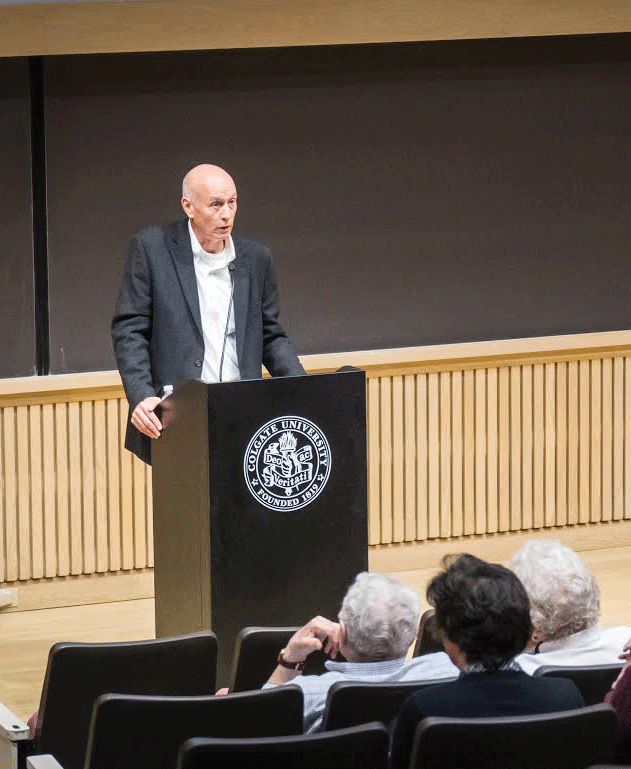Writer Dan Barry Brings Life to His Works
Students gathered in Love Auditorium Thursday, October 6 for another installment of Colgate’s Living Writers series. This event featured Dan Barry, a journalist who has worked at The New York Times for the past 20 years and has written four non-fiction books. Barry has been compared to a modern Steinbeck by friend and novelist Colum McCann, and his writing has received great acclaim.
“The Boys in the Bunkhouse” is the text that was selected for Living Writers, which tells the story of 32 men suffering from intellectual disabilities who were kept in a rundown schoolhouse in Iowa, forced to work 40 hours a week disemboweling turkeys at a nearby processing factory for only $65 a month. The men were beaten if their work speed did not meet expectations.
Barry began his talk by addressing one of the questions he is most frequently asked, that of how he came upon this story of Henry’s Turkey Service. He answered in two parts.
He referred back to his time as an undergraduate at St. Bonaventure University, specifically referring to a custodian named Tony who was stuck with the job of cleaning up the beer-covered dormitories after nights of partying. Barry remembered how some of the other students would mock Tony and take advantage of him because of his intellectual disability. Barry, on the other hand, took the time to get to know Tony and to share meals with him.
“I am as grateful to Tony as I am to any college professor that I had because he helped me to recognize this ‘otherness’ that exists in society, this accepted belief that those with intellectual disability were different, ‘other’ and deserved to be segregated, to be seen not as one of us,” Barry said.
The second part of his answer had to do with his work at the The New York Times with his column “This Land,” which causes him traveling across the United States looking for interesting stories. That was how he came upon this one. He decided he had not been to Iowa in a while, and saw a short news piece. The information included writing about a $240 million jury verdict in favor of 32 men with intellectual disabilities that had been working at a meat processing plant and being paid only $65 a month for decades. The phrase that stood out to him the most, that he loves to this day, was the legal reasoning for the verdict: the loss of enjoyment of life.
The rest of the talk featured Barry sharing bits of this story by reading excerpts from his book, “The Boys in the Bunkhouse.”
“Barry discussed his work in a way that I had never considered, and I left the talk with an even greater appreciation for the people he wrote about,” junior Sarah Brandow said.
Furthermore, students were impressed by the motives behind the piece.
“Barry’s literary journalism felt more impactful, especially after he mentioned that he did not care how financially successful the book was, but felt this story needed to be written and shared,” junior Jack Bick said.
Barry truly moved the audience and brought to life the experiences of these men.






